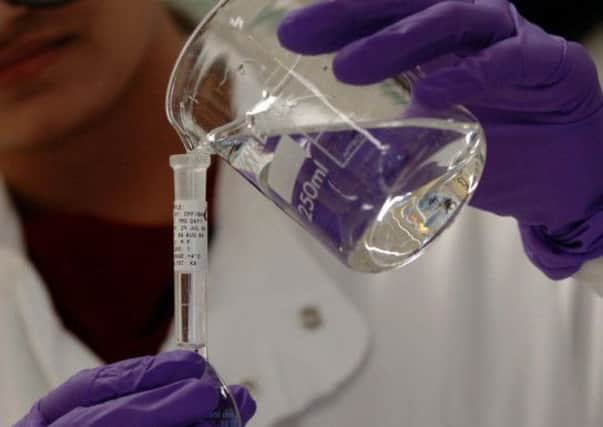Nobel scientist seeks pledge on free speech


The scientist, who was awarded the Nobel Prize for his work in genetics, made his plea after claiming that academics were reluctant to speak out for fear of losing government funding.
The call from one of the UK’s most eminent scientists comes amid concerns that an atmosphere of intimidation is discouraging academics and universities from giving their opinions in the run-up to September’s referendum.
Advertisement
Hide AdAdvertisement
Hide AdSpeaking yesterday at an event organised by the Better Together campaign, Nurse also warned that funding for Scottish research would be put at risk by independence.
Looking towards the vote on 18 September, Nurse said openness and freedom of speech were “crucial” at times of important change.
Too often, he said, the debate had been reduced to “name-calling and jostling” for short-term political advantage.
“Some in our universities apparently feel inhibited about speaking out because of fear of retribution in relation to future funding,” Nurse said. “I do not know if this is correct, but I am sure politicians in both Scotland and the rest of the UK will want an open and free debate, as it is so central to the democratic process and to coming to the right decision. It is, after all, what drove the Scottish Enlightenment.
“To encourage this important debate, both the Scottish and UK governments should endorse a free and open expression of views from academics, and make it clear that there would be no subsequent retribution regardless of the views expressed and the final outcome of the referendum.”
He added: “This is essential for the democratic process and if the right decisions about independence are to be made.”
Later Nurse said he had heard “murmurings” from academics to suggest that universities and their staff were being discouraged from making their voices heard. His claims were echoed by Sir David Carter, a former surgeon to the Queen in Scotland, former chief medical officer in Scotland and former vice-chairman of Cancer Research UK, who also spoke at the event yesterday at Edinburgh University’s George Square Theatre.
Earlier this year, Carter was one of 14 senior medical academics to sign a public letter warning that there was a feeling that the Scottish Government would be “vindictive” towards universities which came out against independence.
Advertisement
Hide AdAdvertisement
Hide AdYesterday he claimed that those in charge of Scotland’s five universities with medical schools – Edinburgh, Aberdeen, Glasgow, St Andrews and Dundee – were reluctant to make their views public.
“Before putting the open letter in the public domain, I wrote round to the principals of the five Scottish universities who have medical schools and said: ‘Am I right to assume that as principals of these universities you feel constrained and unable to speak out about independence?’ and the answer came back that, ‘Yes, we do feel constrained and unable to speak out and we would apply that not just to ourselves as principals but to our senior management as well’,” Carter said.
“I have to say to you that I haven’t the slightest doubt in my mind that if you asked them what they would vote in September they would all be voting No. But they are constrained from speaking out, and we felt it was important that we made this point that we must not interpret silence on the part of the Scottish universities as somehow supportive of the notion of independence.”
Carter added that a survey had shown that 93.5 per cent of Academy of Medical Sciences fellows living in Scotland said they would vote No. A total of the 91 per cent of the Scottish-based fellows believed a Yes vote would have a “negative or strongly negative effect” on research funding.
Last year, the issue of academic freedom of speech came to the fore when sports minister Shona Robison contacted Dundee University to complain about the conduct of history professor Chris Whatley, who attended an event hosted by Better Together.
Carter and Nurse appeared at the Academics Together event yesterday alongside former prime minister Gordon Brown, bacteriologist Sir Hugh Pennington and the former Liberal leader Lord Steel.
Nurse claimed that independence would threaten UK arrangements which see Scotland, with 8.4 per cent of the population, attract 13.1 per cent of research council funding (£257 million in 2012-13).
Last night, education secretary Michael Russell said there was “no evidence” for Nurse’s concerns.
Advertisement
Hide AdAdvertisement
Hide AdRussell’s spokesman said: “The fact that there are academic campaigns on either side of the referendum shows how open and vigorous that debate is. For example, 60 academics have signed a public statement in support of a Yes vote. As the professors themselves say, there is no evidence for their concerns, and as all academics know funding is determined by the Funding Council, which is made up of academics and universities themselves, not by government or politicians.
“With independence we have guaranteed the continuation of research funding across Scotland’s universities and, as research becomes increasingly international an independent Scotland will be in prime position to capitalise on new opportunities.
“Independence will also ensure that by having access to all of our own resources we can maintain free higher education and not face the pressure of Westminster austerity.”